Dr Jeff Breckon CPsychol., Course Leader - MSc Sport & Exercise Psychology

Dr. Jeff Breckon CPsychol.
Course Leader – MSc Sport & Exercise Psychology / MSc Sport & Exercise Science / MSc Physical Activity for Health.
I am the course leader for the MSc Sport and Exercise Psychology and a Chartered Sport and Exercise Psychologist. Most of my career has been spent in Higher Education having lectured since 1995 and I have previously worked in the NHS as a health promotion officer (CHD specialist) as well as in the USA at Western Kentucky University. I am a practising psychologist and a member of the British Psychological Society (BPS) (and Chief examiner for the Qualification in Sport and Exercise Psychology) and The British Association of Sport and Exercise Sciences (BASES).
My main area of interest (in both teaching and research) is physical activity counselling and health behaviour change, and I have published and presented internationally in these areas. I have delivered consultancy and training across the world in Motivational Interviewing and am a member of the Motivational Interviewing Network of Trainers (MINT). My role is split between the sport and exercise teaching department and the Centre for Sport and Exercise Science where I develop and service research projects focussing on health behaviour change in sedentary adults with a range of ill-health conditions. I have been an external examiner at three universities and been a visiting lecturer at a further five.
Dr Rowena AD Bunning - Principal Lecturer in Cell Biology
I came to Shef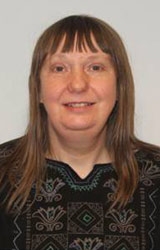 field Hallam via research at the Strangeways Research Laboratory, Cambridge and later the Department of Human Metabolism and Clinical Biochemistry, University of Sheffield and a PGCE.
field Hallam via research at the Strangeways Research Laboratory, Cambridge and later the Department of Human Metabolism and Clinical Biochemistry, University of Sheffield and a PGCE.
I have a keen interest in mammalian cells, their culture, what they can do as the fundamental components of mammalian tissues and organs and what happens when things go wrong.
During my time at Sheffield Hallam I have taught cell biology and immunology at all levels from HND to supervising PhD students and am a Course Leader. I also have a role as quality and learning, teaching and assessment (LTA) co-ordinator in the biosciences department, helping to ensure a quality student experience.
In addition to teaching I am involved in research, focussed on mechanisms of extracellular matrix (ECM) breakdown and repair with particular reference to the role of proteinases and cytokines. This is particularly relevant to cartilage breakdown in arthritis, remodelling of central nervous system ECM, as occurs in multiple sclerosis and tumour invasion and metastasis. I have over 45 publications in this area.
Dr Adrian Hall, Biosciences senior lecturer
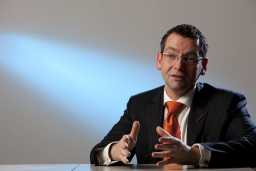 What are the most rewarding aspects of your job?
What are the most rewarding aspects of your job?
'I love engaging students with the elegance and innovation of genetics and molecular biology, and watching their skills and knowledge develop over the period of the course. To then follow the careers of our graduates as they use their qualification as a step on their chosen career path is the
most rewarding experience.'
Are there any special facilities available for your students?
'The laboratory facilities within the biosciences department are equipped to a very high standard with state-of-the-art equipment. So our students not only gain knowledge of developing subject areas, but also the relevant hands-on skills that are held in high regard by employers. In addition to the teaching laboratory facilities, our postgraduate students also have access to more
specialised equipment located within our research facility, the Biomedical Research Centre.'
What type of jobs do your graduates go on to do?
'Our graduates have gone on to further careers in research with a number gaining PhD places and technical positions in research labs. They are also qualified to work within both the pharmaceutical industry and hospital environments.'
Dr Christine Ferris, PhD, PgDip ARQE, BEd(Hons) TDCR
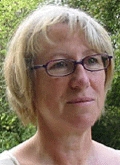
Research interests/current work
My current work involves curriculum and professional development at Peradeniya University, Sri Lanka, leading the project planning module for the Doctorate in Professional Studies, supervision of doctoral students in the Faculty of Health and Wellbeing, supervision of MPhil students in the Faculty of Arts, Computing, Engineering and Sciences and supervision of medical imaging and medical ultrasound Masters and undergraduate research projects.
I am the research co-ordinator for PRADO, a subject group consisting of paramedics, diagnostic radiographers and operating department practitioners. Current research activities include the training and management of a team of community co-researchers for data collection and analysis to evaluate eight community projects in the Healthy Living Project, Barnsley PCT. My particular research interests are role development, history of radiography and radiology, the impact of digital imaging on (de)centralisation of health services, 3D imaging and co-researcher involvement.
Dr Kate Heward - Senior Lecturer
I  have worked as a senior lecturer at Sheffield Hallam University since January 2006. My specialist area of teaching, research and clinical practice is neurological rehabilitation. Before starting this post I had spent many years working as a clinician in the NHS, the most recent post being a clinical specialist occupational therapist at the Leeds Teaching Hospitals.
have worked as a senior lecturer at Sheffield Hallam University since January 2006. My specialist area of teaching, research and clinical practice is neurological rehabilitation. Before starting this post I had spent many years working as a clinician in the NHS, the most recent post being a clinical specialist occupational therapist at the Leeds Teaching Hospitals.
I have represented occupational therapy in the re-write of the Royal college of Physicians Guidelines on the use of bottulinum toxin for adults with acquired spasticity. I also continue to carry out some private clinical practice for a specialist brain injury rehabilitation team and through my own business called Rehabilitate.
Summary of research activity
My PhD, was entitled 'The Occupational Impact of Multiple Sclerosis: A Qualitative study of Partners and a family'. I have published work from my thesis and have also presented at both national and international conferences.
Ross, D, Heward, K, Bhakta, B, Chamberlain, M, Salawu, Y. (2008) Upfront and Enabling: Audit of a Specialist Multidisciplinary Rehabilitation Team. International Journal of Therapy and Rehabilitation, Feb.
Royal College of Physicians, British Society of Rehabilitation Medicine, Chartered Society of Physiotherapy, Association of Chartered Physiotherapists interested in Neurology. Spasticity in Adults: Management using botulinum toxin. National Guidelines. London RCP, 2009 (OT advisor and co author)
Dr David James, Course Leader - MSc Sport Engineering
 I am course leader for the University’s MSc in Sports Engineering. This is a unique programme and a course that I have personally developed with to meet the demands of the sports equipment industry. I have extensive contacts and strong relationships with some of the key players within the industry and was recently voted onto the Executive Committee of the International Sports Engineering Association.
I am course leader for the University’s MSc in Sports Engineering. This is a unique programme and a course that I have personally developed with to meet the demands of the sports equipment industry. I have extensive contacts and strong relationships with some of the key players within the industry and was recently voted onto the Executive Committee of the International Sports Engineering Association.
I have a mechanical engineering background with a PhD from the University of Sheffield that focused on modelling the complex bounce of a cricket ball. I have been privileged to work in a world leading research centre for eleven years and have published extensively in a range of sports engineering areas. My current area of research is focusing on the historical impact of technology in sport and the ethical considerations of an increasingly scientific sporting arena.
I am a leading science communicator and was recently awarded a prestigious fellowship in public engagement from the Royal Academy of Engineering. I regularly deliver high profile lectures on the role that technology plays in sport and have appeared on countless stages including the Cheltenham Science Festival; the BA Festival of Science, The Manchester Science Festival and the Royal Institute’s Faraday lecture theatre.
Dr Alessandra Princivalle - Senior Lecturer in pharmacology and neuroscience
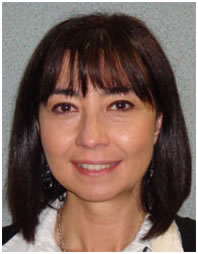 I joined Sheffield Hallam University in 2007 as a senior lecturer in pharmacology and neuroscience.
I joined Sheffield Hallam University in 2007 as a senior lecturer in pharmacology and neuroscience.
My BSc was in biochemical sciences, and my Italian PhD was in molecular biology from University of Milan titled 'Cloning of cDNA for human fibrinogen gamma-chain'. My English PhD was in pharmacology from University of Birmingham, Division of Neuroscience, Medical School. My PhD was entitled ‘Studies of GABAB receptors in epilepsy', which was about quantitative expression of these receptors subunits and isoforms in human subjects affected by, and animal model of epilepsy.
I continued postdoctoral research at Institute of Neurology in Milan and University of Birmingham remaining within my research interest and studied genes involved in neuronal circuits.
I also have a PGCE in Higher Education from the Sheffield Hallam and have previously taught at University of Milan and University of Birmingham.
At Sheffield Hallam I teach undergraduate years two and three and masters level. I am also module leader for pharmacological basis of therapeutics (year two), research methods (masters), and research and professional methods (masters). I am also the course leader for MSc Pharmacology.
Professor Nicola Woodroofe - Head of Biomedical Research Centre
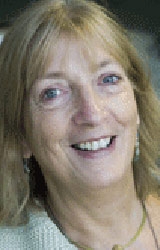 Nicola initially started work at Sheffield Hallam as a senior lecturer in immunology in 1994. Prior to this she obtained both her BSc Biochemistry degree and PhD in biochemistry for the University of London (Chelsea College, now King's College, London). This was followed by a lengthy postdoctoral research period, firstly in the USA and then at the Institute of Neurology in London, researching initially muscular dystrophy and since 1983 her research has been focussed on understanding the mechanisms underlying multiple sclerosis. In 2005 Nicola's research record was recognised through her appointment as a professor of neuroimmunology at Sheffield Hallam University.
Nicola initially started work at Sheffield Hallam as a senior lecturer in immunology in 1994. Prior to this she obtained both her BSc Biochemistry degree and PhD in biochemistry for the University of London (Chelsea College, now King's College, London). This was followed by a lengthy postdoctoral research period, firstly in the USA and then at the Institute of Neurology in London, researching initially muscular dystrophy and since 1983 her research has been focussed on understanding the mechanisms underlying multiple sclerosis. In 2005 Nicola's research record was recognised through her appointment as a professor of neuroimmunology at Sheffield Hallam University.
Nicola's main areas of teaching are related to her research interests, thus she teaches clinical immunology, neuroscience and research methods at MSc level as well as supervising final year BSc research projects.
Nicola is currently the head of the Biomedical Research Centre (BMRC) which has a thriving body of academic staff, postdoctoral research assistants and PhD students engaged in research relating to disease mechanisms, molecular microbiology, pharmacology and bioanlaytical science.
As head of the research centre, Nicola is responsible for compiling our research activity returns for the government's assessment of university research, the Research Excellence Framework (REF). There is also a commercial service in the BMRC offering contract research and consultancy, which is also managed by Nicola.
Nicola continues to pursue research into multiple sclerosis and her work is funded in part by the UK Multiple Sclerosis Society. She also collaborates closely with consultant neurologists at Sheffield Teaching Hospitals NHS Foundation Trust in the research on MS. Her research work has resulted in over 60 publications and more than 10 students have gained their doctoral degrees under her supervision. Her research team present their work at national and international research conferences.
Nicola is the chairperson of the Neuroimmunology affinity group of the British Society for Immunology and is a member of the organising committee of the European School of Neuroimmunology.